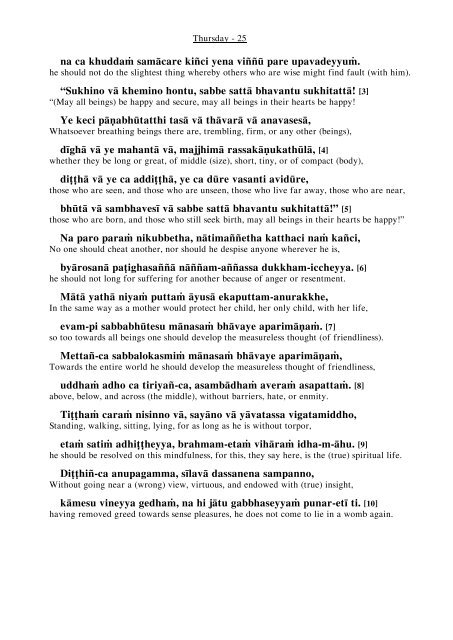Daily Chanting, a book of daily worship
A Pāli and English line by line (interlinear) version of this collection of chanting texts from the Theravāda tradition meant for daily recital.
A Pāli and English line by line (interlinear) version of this collection of chanting texts from the Theravāda tradition meant for daily recital.
Create successful ePaper yourself
Turn your PDF publications into a flip-book with our unique Google optimized e-Paper software.
Thursday - 25<br />
na ca khuddaṁ samācare kiñci yena viññū pare upavadeyyuṁ.<br />
he should not do the slightest thing whereby others who are wise might find fault (with him).<br />
“Sukhino vā khemino hontu, sabbe sattā bhavantu sukhitattā! [3]<br />
“(May all beings) be happy and secure, may all beings in their hearts be happy!<br />
Ye keci pāṇabhūtatthi tasā vā thāvarā vā anavasesā,<br />
Whatsoever breathing beings there are, trembling, firm, or any other (beings),<br />
dīghā vā ye mahantā vā, majjhimā rassakāṇukathūlā, [4]<br />
whether they be long or great, <strong>of</strong> middle (size), short, tiny, or <strong>of</strong> compact (body),<br />
diṭṭhā vā ye ca addiṭṭhā, ye ca dūre vasanti avidūre,<br />
those who are seen, and those who are unseen, those who live far away, those who are near,<br />
bhūtā vā sambhavesī vā sabbe sattā bhavantu sukhitattā!” [5]<br />
those who are born, and those who still seek birth, may all beings in their hearts be happy!”<br />
Na paro paraṁ nikubbetha, nātimaññetha katthaci naṁ kañci,<br />
No one should cheat another, nor should he despise anyone wherever he is,<br />
byārosanā paṭighasaññā nāññam-aññassa dukkham-iccheyya. [6]<br />
he should not long for suffering for another because <strong>of</strong> anger or resentment.<br />
Mātā yathā niyaṁ puttaṁ āyusā ekaputtam-anurakkhe,<br />
In the same way as a mother would protect her child, her only child, with her life,<br />
evam-pi sabbabhūtesu mānasaṁ bhāvaye aparimāṇaṁ. [7]<br />
so too towards all beings one should develop the measureless thought (<strong>of</strong> friendliness).<br />
Mettañ-ca sabbalokasmiṁ mānasaṁ bhāvaye aparimāṇaṁ,<br />
Towards the entire world he should develop the measureless thought <strong>of</strong> friendliness,<br />
uddhaṁ adho ca tiriyañ-ca, asambādhaṁ averaṁ asapattaṁ. [8]<br />
above, below, and across (the middle), without barriers, hate, or enmity.<br />
Tiṭṭhaṁ caraṁ nisinno vā, sayāno vā yāvatassa vigatamiddho,<br />
Standing, walking, sitting, lying, for as long as he is without torpor,<br />
etaṁ satiṁ adhiṭṭheyya, brahmam-etaṁ vihāraṁ idha-m-āhu. [9]<br />
he should be resolved on this mindfulness, for this, they say here, is the (true) spiritual life.<br />
Diṭṭhiñ-ca anupagamma, sīlavā dassanena sampanno,<br />
Without going near a (wrong) view, virtuous, and endowed with (true) insight,<br />
kāmesu vineyya gedhaṁ, na hi jātu gabbhaseyyaṁ punar-etī ti. [10]<br />
having removed greed towards sense pleasures, he does not come to lie in a womb again.


















